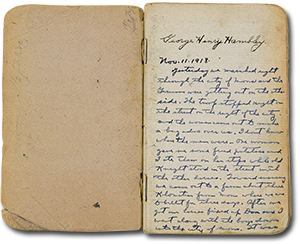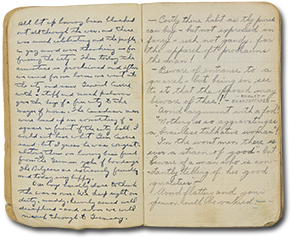The 100th anniversary of the First World War is now finished but the records will continue to be preserved at the Archives and accessible to current and future generations who want to know more about the time period. In addition, this blog will remain on our website as an additional resource.
November 2018 Posts:
- 26 November: “Hurrah for the Allies”: HBC post journals and the end of the war
- 19 November: Captain Clarence Boswell on Garrison Duty with the Winnipeg Rifles in Germany
- 13 November: The end of the war and plans for the future
- 9 November: Armistice: November 11, 1918
- 7 November: Remembrance Day 2018: Remembering the First World War
- 5 November: Remembering the Armistice at the Archives of Manitoba
26 November 2018
“Hurrah for the Allies”: HBC post journals and the end of the war
On November 11, 1918, the Armistice was signed between the Allied forces and Germany, ending the Great War. The news spread quickly and was jubilantly celebrated throughout Canada. The journals kept at HBC posts during this time offer a glimpse into, not only how the news was celebrated, but how long it took the news to reach Canada's more remote corners, relying on sporadic mail delivery to hear about it.
Many of the post journals kept in 1918 don't report on the end of the war at all. Their focus remains on detailing the day-to-day business taking place at the posts. Others are more concerned with the desperate situation caused by the outbreak of Spanish Influenza.
The writer of the journal kept at HBC's fur purchasing agency in St. John's, Newfoundland naturally got the news right away. His somewhat subdued entry for November 11 reads:
“Fair & Cold: Mr Taylor at books. Mr Carson Labrador Accounts. Leo typing & messages. Miss Grimes & Dawson typing & filing. L.C. typing. (Peace Proclaimed).”
(St. John’s Agency post journal, HBCA B.476/a/1)
In northern Saskatchewan, the journal writer in Ile-a-la-Crosse appeared to have followed the news of the war quite closely and received the news as it broke, despite being far more remote than his colleague in St. John's. On November 5 he writes:
“War Reports Austria has surrendered unconditionally”
Two days later:
“Word over the Wire today ‘Unconditional surrender of Germany’ ”
Then, on November 11:
“War News ‘Bill fled into Holland serious Riots in Berlin – ’ “
(Ile-a-la-Crosse post journal, HBCA B.89/a/40)
Other journal writers heard about the end of the war a few days after the signing of the Armistice.
The post manager at Buffalo River, Saskatchewan, got the news on November 14:
“Abraham [Maurice?] arrived from Isle ala Crosse & has reported the war is Finished & that the German Emperor has quit his job & ran to Holland. Very Good News ‘Hurrah for the Allies.’ I wouldn’t like to be a German to-day.”
(Buffalo River post journal, HBCA B.225/a/2)
Fort Alexander, Manitoba, received the news on November 16:
“We heard about Peace being declared today and put up the flag.”
(Fort Alexander post journal, B.4/a/9)
However, the posts to the north of Fort Alexander only got the news in the middle of December. On December 3, the Norway House post manager writes:
“I walked over to Rossville and visited Dr. Norquay and Const. Durant to ascertain if there is any truth in the rumor that the War is over. Word was apparently sent from Cross Lake to this effect, but I was unable to assure that the source of the rumor is anything more than an Indian Story. ‘Spanish Flu’ was also reported at an Indian camp at Clearwater Lake, some two or three days north of Cross Lake. It is to sincerely hoped that the latter is not correct, but if the former is true, and we can only hope that it is, the Lord be praised!”
This rumor is only confirmed on December 13:
“Heard the news today that the war is over! Went over to Rossville to carry news there. Thence to the Marshalls to give them the news.”
(Norway House post journal, HBCA B.154/a/87)
The manager in York Factory had to wait until December 16 to hear about peace:
“Mail arrived from end of steel @ 12 oc. Great News Germany surrendered on Nov 11th, the ‘___ & ___’ combination [past?]. The whole staff walking on air.”

This writer also went back to his entry for November 11 to add in bold letters:
“WAR OVER”.

For Moose Factory, it wasn’t until Christmas Eve that the news reached them through their mail delivery. Their previous mail had arrived on November 11, so the news had just missed them.
The entry for December 24 includes a newspaper clipping that sums up how the nation was feeling:
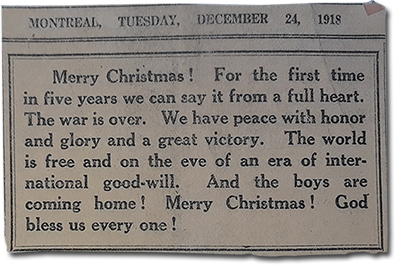
Search Tip: To find post journals, search “post journal” in Keystone.
Feedback
E-mail us at archiveswebmaster@gov.mb.ca with a comment about this blog post. Your comments may be included on this page.
19 November 2018
Captain Clarence Boswell on Garrison Duty with the Winnipeg Rifles in Germany
After the Armistice was declared on November 11, 1918, Captain Clarence Boswell travelled with the 8th Battalion, 90th Winnipeg Rifles to be part of the occupation force in Germany. In a letter to his mother written on December 3 he wrote about the Belgian people they encountered on their march:
“The Belgians are most bitter against the Bosche and are correspondingly well disposed toward us. During the Hun occupation they seized quantities of brass and copper from the Belgians. Quite a quantity must have been hidden from them though, for an amusing part of our welcome was a display of brass and copper utensils pots and pans which had been cached from the Hun but were produced at the windows for our inspection all brilliantly polished. Here as in most places quantities of blankets were confiscated. Horses were requisitioned in large numbers the price paid being about one half the value and in marks. At one billet where we were lodged the host a schoolmaster was deprived of five hundred bottles of choice wine. It was amusing to hear him describe its merits magnifique, delicieuse, etc. Burgundy, Graves and Pommard.”
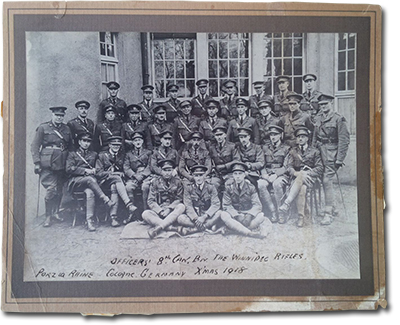

The 8th Battalion, Winnipeg Rifles was stationed in Germany from December 14 to January 6. Boswell described his impressions of Germany in a letter to his mother on 8 January 1919:
“For wealth in factories of numerous kinds and general industries I never saw anything to equal the Rhinelands in the district where we were quartered. In every direction one could see tall factory chimneys almost too numerous to count. The scene after darkness was particularly attractive there were so many millions of lights from towns streets and factories. The navigation on the Rhine was also always most alluring to me. I always had a taste for shipping, perhaps because I had never seen much of it. Cologne or Koln as the Germans call it and Bonn were the only cities we saw but the district is full of very thriving towns and villages. Population is very dense. I am told that in the Rhine valley there is a population of over seven million – almost as great as Canada. I can well understand that the great business and manufacturing industries there would engender business and trade rivalry and later jealousy.”
Boswell continued his letter by remarking on the future. His brother, John, was to have sailed for Canada on 29 December, with plans to arrange for his English war bride to follow later. Clarence looked forward to his own return now that his reason for enlisting had been accomplished:
“We are all fed up with this country which can now offer no knew experiences as garrison duty was that last thing we would think of enlisting for we are keen to get back to God’s country.”
Search Tip: Search “Boswell” in Keystone to find out more about Boswell and his First World War letters.
Feedback
E-mail us at archiveswebmaster@gov.mb.ca with a comment about this blog post. Your comments may be included on this page.
13 November 2018
The end of the war and plans for the future
Lieutenant Frank Leathers was serving with the Canadian Field Artillery in Belgium when the First World War ended and described it in a letter to his brother Bruce on 12 November 1918:
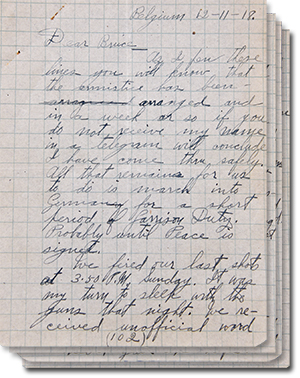
(4 images)
“As I pen these lines you will know that the armistice has been arranged and in a week or so if you do not receive my name in a telegram will conclude I have come thru safely. All that remains for us to do is march into Germany for a short period of Garrison Duty. Probably until Peace is signed.
We fired our last shots at 3:50 P.M. Sunday. It was my turn to sleep with the guns that night. We re-ceived unofficial word the armistice was signed at 6:30 Monday morning. The Major called in the French people and gave them the news. A wild scene followed. I had a pretty good stand-in with the household so had coffee pie, cakes, etc. handed to me up to the last minute I was there. All attempts to describe the remainder of the day are futile. The evening and this morning were not easy for those of us who kept sober.”
Frank Leathers enlisted in November 1914 when he was a first-year engineering student at the University of Manitoba. He became engaged to Frances Estelle Dayton in 1918 and when he returned to Canada they could be married. However, after being in the military for four years, Leathers needed to decide how he would make his living.
In a letter to his mother written on 12 January 1919 he wrote:
“I do not feel like teaching school and I am a little too old and tired for the engineering so am really in a quandary what to do.”
His younger brothers had not served and were planning to leave the family farm, so Leathers considered taking over his parents’ farm. The war had changed the direction of his life and Leathers summed up its impact:
“Now however I am 27, have enough education to enjoy life, have toured Western Europe, have made good in the army have just lost health to that extent that I don’t want to pick anything very hard, and I am in a position to go back on the farm at nearly my own terms so if F. E. is willing and you think my ideas are sound I shall probably try it.”
In a 14 March 1915 letter, Leathers asked his mother to keep his letters because:
“It is too much trouble to keep a diary here and I would like to have some record of this expedition.”
We are grateful that these letters were preserved as they provide a compelling record of the experiences and thoughts of a Manitoba soldier during the First World War.
Leathers is one of several individuals featured in our hallway display. Visit the Archives of Manitoba to see this display or to see other records related to the First World War. We are located at 200 Vaughan Street in Winnipeg, and we are open Monday to Friday from 9 a.m. to 4 p.m.
Search Tip: Search “Frank Leathers” in Keystone to find out more about Leathers and his First World War letters.
Feedback
E-mail us at archiveswebmaster@gov.mb.ca with a comment about this blog post. Your comments may be included on this page.
9 November 2018
Armistice: November 11, 1918
One hundred years ago, on the November 11, 1918, the Armistice was signed and the First World War ended. After almost 4 ½ years of war, peace was declared. In total, more than 650,000 Canadians and Newfoundlanders served; over 170,000 were wounded and more than 66,000 died. Canadian soldiers stayed in Europe to help build the peace after the Armistice and most returned home sometime in 1919.
Manitobans celebrated the Armistice throughout the province. This photograph shows the celebrations on Portage Avenue, in Winnipeg.
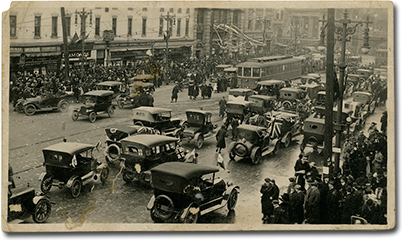
We have several records – letters and diary entries – written by Manitobans in France, Belgium and England when the Armistice was signed. Three diary entries for November 11, 1918 are featured below.
Colonel R.M. Dennistoun wrote in his diary from Headquarters in London, England:
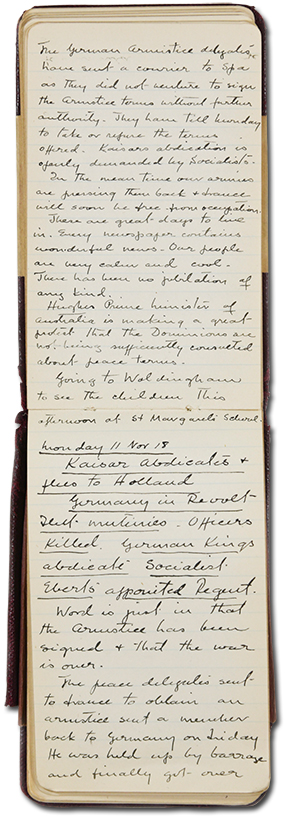
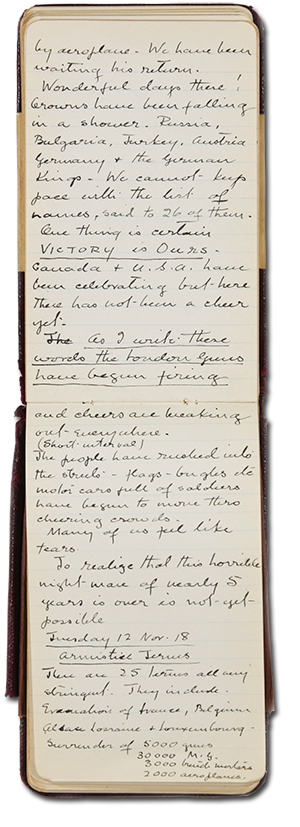
Monday 11 November 18
Kaiser abdicates & flees to Holland. Germany in Revolt. Fleet mutinies. Officers killed. German Kings abdicate. Socialist Eberts appointed Regent.
Word is just in that the Armistice has been signed & that the war is over.
The peace delegates sent to France to obtain an armistice sent a member back to Germany on Friday.
He was held up by barrage and finally got over by aeroplane. We have been waiting his return.
Wonderful days these!Crowns have been falling in a shower. Russia, Bulgaria, Turkey, Austria, Germany & the German Kings. We cannot keep pace with the list of names, said to 26 of them.
One thing is certain VICTORY is Ours.
Canada & U. S. A. have been celebrating but here there has not been a cheer yet.
-----------------
As I write these words the London Guns have begun firing and cheers are breaking out everywhere.
The people have rushed into the streets – flags – bugles, etc. motor cars full of soldiers have begun to move thro cheering crowds.
Many of us feel like tears.
To realize that this horrible nightmare of nearly 5 years is over is not yet possible.
Captain James Uhlman wrote this simple entry in his diary, written in France.
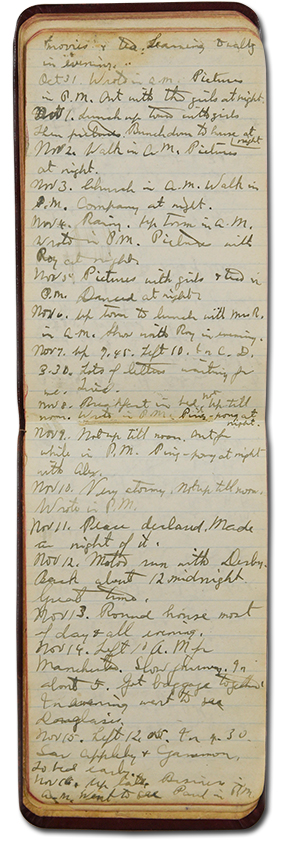
Nov 11. Peace declared. Made a night of it.
Private George Henry Hambley, wrote this entry, in Belgium.
November 11, 1918
Yesterday we marched right through the city of Mons and the Germans were getting out on the other side. The troop stopped right on the street on the right of the city and the women came out to make a big ado over us. I don’t know where the men were. One woman gave me some fried potatoes and I ate them on her steps while old Knight stood in the street with the other horses. Toward evening we came out to a farm about three kilometres from Mons where we are to billet for three days. After we got our horses fixed up, Don and I went along with the boys down into the city of Mons. It was all lit up, having been blacked out all through the war, and there was much celebrating and the people in gay mood were thanking us for freeing the city. Then today the armistice is proclaimed and, after we cared for the horses, we went into the city and saw General Currie with a staff and much palaver give the keys of a free city to the Mayor of Mons. The Canadian men were lined up in something of a square in front of the city hall. I could not hear what General Currie said but I guess he was congratulating them on having been freed from the German yoke of bondage. The Belgians are extremely friendly and today very happy.
Our boys hardly dare to think this war is over. We keep right on: dirty, muddy, heavily armed, well-disciplined – and soon we will march through to Germany.
Feedback
E-mail us at archiveswebmaster@gov.mb.ca with a comment about this blog post. Your comments may be included on this page.
7 November 2018
Remembrance Day 2018: Remembering the First World War
The Archives continues its efforts to highlight records created during the time of the First World War, 1914-1918. This week, we are commemorating the 100th anniversary of the Armistice and of peace being declared. We invite you to you learn more about Manitobans who served in the First World War.
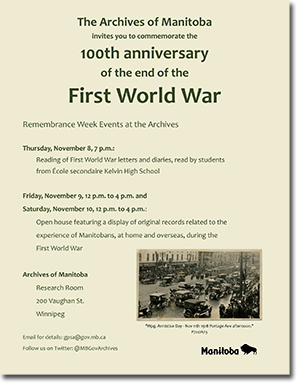
- Attend our Remembrance Week events. See poster for details and read more on our 5 November blog.
- Visit the display in our hallway entitled, “1918: selected records from the last year of the war”. This display features a selection of letters, diary entries and photographs documenting nine Manitobans serving overseas in 1918. You can explore the exhibit on your own at no cost during regular business hours.
- Read our blog, At Home and Away. Since May 2014, we have been blogging weekly about records created during the First World War, documenting both the soldiers overseas and activities on the home front. From April 2016 to April 2017, we posted the weekly letters of one soldier, George Battershill of East Kildonan, who was injured at Vimy Ridge and died from those injuries.
- Search our index. The Archives of Manitoba has created an electronic index of 1,092 of the Manitoba soldiers killed in the First World War. This index was generated from a series of index cards created by the Manitoba government for the purpose of documenting Manitoba casualties of the First World War. The original index was made during and after the war but was not a complete record and included some inaccuracies, particularly with dates. As a result, this electronic index is also not a complete list of Manitobans killed in the First World War. (Read our June 29, 2015 blog for more about the index.)
Feedback
E-mail us at archiveswebmaster@gov.mb.ca with a comment about this blog post. Your comments may be included on this page.
5 November 2018
Remembering the Armistice at the Archives of Manitoba
“Nov 11. Peace declared. Made a night of it.”
Captain James Uhlman (Archives of Manitoba, James Uhlman diary, P7913/7).
The Archives of Manitoba invites you to commemorate the 100th anniversary of the end of the First World War. We will be holding events on three days:
On November 8, we will host a reading of letters and diaries written by soldiers and their families. These will be read by students from Kelvin High School. The reading will take place in the Archives Research Room at 7 p.m.
On November 9 and 10, from noon to 4 p.m. on both days, we will host an open house in our Research Room. The open house will feature a display of numerous records related to the First World War, the participation of Manitobans in the war, and the activities going on at home. These will include:

- letters written and sent home by several Manitoban soldiers
- diaries of Manitoban soldiers and officers, recording their experiences through the war
- newspapers showing reports of the Armistice
- Rolls of Honour created by several companies and organizations remembering their employees and members who served in the war
- records showing the plans for the creation of Memorial Boulevard in Winnipeg
- records showing activities on the home front, both in support of the war, and of those opposed to it
- records showing some important events and activities related to the Manitoba government at the time, including the construction of the Legislative Building and women’s suffrage
- film footage of veterans reminiscing about the First World War
- …and more!
These are unique opportunities to commemorate the First World War and to get a glimpse of the experience of Manitobans through the records of people who were there. The records of individual soldiers help us to learn and remember history in a unique and personal way. These are the stories of Manitobans, preserved at the Archives of Manitoba, for future generations. Please join us!
Feedback
E-mail us at archiveswebmaster@gov.mb.ca with a comment about this blog post. Your comments may be included on this page.




